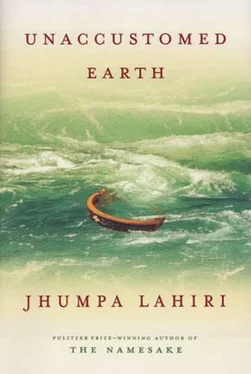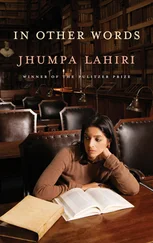"It's a cigarette you smell," he said when he came back to bed. "Someone has been smoking in the bathroom."
"I didn't know Dr. Choudhuri smoked," my mother said. "Should we have put out an ashtray?"
In the morning you all slept in, victims of jet lag, reminding us that despite your presence, your bags crowding the hallways, your toothbrushes cluttering the side of the sink, you belonged elsewhere. When I returned from school in the afternoon you were still sleeping, and at dinner-breakfast for you-you all declined the curry we were eating, craving toast and tea. It was like that for the first few days: you were awake when we slept, sleeping when we were awake; we were leading antipodal lives under the same roof. As a result, apart from the fact that I wasn't sleeping in my own room, there was little change. I drank my orange juice and ate my bowl of cereal and went off to the bus stop as usual. I spoke to no one of your arrival; I almost never revealed details of my home life to my American friends. As a child, I had always dreaded my birthdays, when a dozen girls would appear in the house, glimpsing the way we lived. I don't know how I would have referred to you. "A family friend," I suppose.
Then one day I came home from school and found your parents awake, their ankles crossed on top of the coffee table, filling up the sofa where I normally sat to watch The Brady Bunch and Gilligan's Island. They were chatting with my mother, who was in the recliner with a bowl in her lap, peeling potatoes. Your mother was dressed in a nylon sari of my mother's, purple with red dots in various sizes. Distressing news of your mother's missing suitcase had come: it had been located in Rome but had been placed on a flight to Johannesburg. I remember thinking that the sari looked better on your mother than on mine; the intense purple shade was more flattering against her skin. I was told that you were outside in the yard. I did not go out to look for you. Instead I practiced the piano. It was nearly dark by the time you came in, accepting the tea that I was still too young to drink. Your parents drank tea as well, but by six o'clock the bottle of Johnnie Walker was on the coffee table, as it would be every night that you stayed with us. You had gone out in only a pullover, your father's costly camera slung around your neck. Your face showed the effects of the cold, your eyes blazing, the borders of your ears crimson, your skin glowing from within.
"There's a stream back there," you said, "in those woods."
My mother became nervous then, warning you not to go there, as she had so often warned me, as I had warned you the night you came, but your parents did not share her concern. What had you photographed? they asked instead.
"Nothing," you replied, and I took it personally that nothing had inspired you. The suburbs were new to you and to your parents. Whatever memories you possessed of America were of Cambridge, a place that I could only dimly recall.
You took your tea and disappeared to my room as if it were yours, emerging only when summoned for dinner. You ate quickly, not speaking, then returned upstairs. It was your parents who paid me court, who asked me questions and complimented me on my manners, on my piano playing, on all the things I did to help my mother around the house. "Look, Kaushik, how Hema makes her lunch," your mother would say as I prepared a ham or turkey sandwich after dinner and put it in a paper bag to take to school the next day. I was still very much a child, while you, just three years older, had already eluded your parents' grasp. You did not argue with them and yet you did not seem to talk to them very much, either. While you were outside I'd heard them tell my mother how unhappy you were to be back. "He was furious that we left, and now he's furious that we're here again," your father said. "Even in Bombay we managed to raise a typical American teenager."
I did my homework at the dining table, unable to use the desk in my room. I worked on my ancient Rome report, something that had interested me until your arrival. Now it seemed silly, given that you'd been there. I longed to work on it in privacy, but your father talked to me at length about the structural aspects of the Colosseum. His civil engineer's explanations went over my head, were irrelevant to my needs, but to be polite I listened. I worried that he would want to see whether I had incorporated the things he said, but he never bothered me about that. He hunted through his bags and showed me postcards he'd purchased, and though it had nothing to do with my report, he gave me a two-lire coin.
When the worst of your jet lag had subsided we went to the mall in my parents' station wagon. Your mother needed bras, one item that she could not borrow from my voluptuous mother. At the mall our fathers sat together in a sunken area of benches and potted plants, waiting, and you were given some money and allowed to wander off while I accompanied our mothers to the lingerie department in Jordan Marsh. Your mother led us there, with the credit card your father had handed to her before they parted. Normally we went to Sears. On her way to the bras she bought black leather gloves and a pair of boots that zipped to the knee, never looking at the price before taking something off the shelf. In the lingerie department it was me the saleswoman approached. "We have lovely training models, just in," she said to your mother, believing that I was her daughter.
"Oh, no, she's far too young," my mother said.
"But look, how sweet," your mother said, fingering the style the saleswoman presented on a hanger, lacy white with a rosebud at its center. I had yet to get my period and, unlike many of the girls at school, still wore flower-printed undershirts. I was ushered into the fitting room, your mother watching approvingly as I took off my coat and sweater and tried on the bra. She adjusted the straps and attached the hook at the back. She tried things on as well, topless beside me without shame, though it embarrassed me to see her large, plum-colored nipples, the surprising droop of her breasts, the dark patches of underarm hair that gave off a faintly acrid but not altogether unpleasant smell. "Perfect," your mother said, running her finger below the elastic, along my skin, adding, "I hope you know that you're going to be very beautiful one day." Despite my mother's protests, your mother bought me my first three bras, insisting that they were a gift. On the way out, at the makeup counter, she bought a lipstick, a bottle of perfume, and an assortment of expensive creams that promised to firm her throat and brighten her eyes; she was uninterested in the Avon products my mother used. The reward for her purchases at the makeup counter was a large red tote bag. This she gave to me, thinking that it would be useful for my books, and the next day I took it to school.
After a week your father began his new job, at an engineering firm forty miles away. At first my father got up early and dropped him off before returning to Northeastern to teach his economics classes. Then your father bought an Audi with a stick shift. You stayed home with our mothers-your parents wanted to wait until they'd bought their home to see which school you would go to. I was stunned, and envious-half a year without school! To my added chagrin, you were not expected to do anything around the house, never to return your plate or glass to the sink, never to make my bed, which I would see from time to time through the partly open door to my room in a state of total disarray, the blanket on the floor, your clothes heaped on my white desk. You ate enormous amounts of fruit, whole bunches of grapes, apples to their cores, a practice that fascinated me. I did not eat fresh fruit then; the textures and intensity of flavors made me gag. You complained about the taste, or lack of taste, but nevertheless decimated whatever my parents brought home from Star Market. I would find you, when I came home in the afternoons, always at the same end of the sofa, the toes of your thin bare feet hooked around the edge of the coffee table, reading books by Isaac Asimov that you'd picked off my father's shelves in the basement. I hated Doctor Who, the one show you liked on television.
Читать дальше












